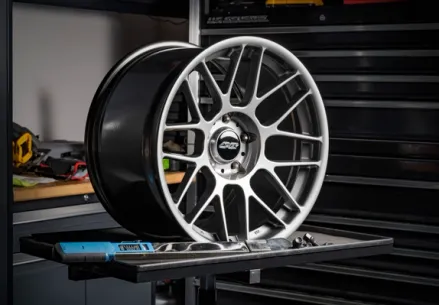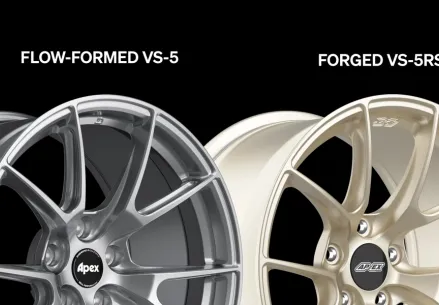
Why Are My Tires Rubbing? Common Causes & Fixes for Wheel and Tire Fitment Issues
Article | 03/05/2020 by Cory Smetzler
Updated on 05/13/2025
- In this article we explore what causes tires to rub and explain how to fix that problem.
- Whether it’s a byproduct of an aggressive fitment, a failing suspension, or oversized tires, there are many reasons why tires will rub. Luckily, there are also many fixes.
- We discuss the relationship suspension geometry and wheel and tire sizing has with tire clearance.
So you’ve just fitted a new wheel and tire setup to your car that you painstakingly researched, given a test-fit, and felt confident would deliver the look and performance you were after. The car looks perfect on the ground and everything seemed to have the right clearances on the lift, but you’re getting a nasty rubbing sound when taking corners, hitting bumps, or with the steering at full lock while parking. Your tires are rubbing. Is there any worse feeling?
Unfortunately tire rubbing is more than just an annoying noise, it’s a sign that something in your setup isn’t dialed-in properly. Tires rubbing can lead to premature tire wear, damaged fenders, and in some extreme cases, can become a safety hazard. But why are your tires rubbing? There are a number of things that can cause tires to rub, from running an overly aggressive fitment to worn out suspension components no longer carrying their weight. In this article, we’re going to look at the causes of tire rubbing and break down how to fix the problem the right way.

Common Causes of Tire Rubbing
Oversized Tires Running meatier tires for increased grip or aesthetics is a very common move for enthusiasts from a really wide variety of car cultures. Unfortunately, if your tire diameter or width exceeds your car’s available clearance – particularly at full steering lock or when your suspension compresses – you’re almost guaranteed to have them rub. This issue is especially common when going up in sidewall height without adjusting wheel offset with spacers (or different wheels) or dialing-in some negative camber.
Incorrect Wheel Offset A wheel’s offset determines where the wheel sits relative to the hub. If a wheel’s offset is too low (more “poke”), your tires might rub against the fenders. If the offset is too high, you risk the wheel coming into contact with suspension components or inner fender liners. This is especially critical on platforms with limited inboard clearances like BMW’s E90/E91/E92/E93 chassis.
Worn Suspension Components Old shocks, tired bushings, or sagging springs can throw your suspension geometry out of spec, which will lower your effective ride height and reduce your fender clearance. A worn suspension will compress more easily, making rubbing more likely over dips, driveways, or spirited driving. Tired suspension components can also become a hazard in some cases, so it’s important to keep an eye on these parts and replace or upgrade them as they start to fade.
Aftermarket Suspension or Ride Height Changes Installing lowering springs or adjustable coilovers will often tighten up your fender-to-tire gap substantially. High-performance suspension setups almost always use one or the other and have some degree of lowering, which happens to look great in addition to aiding in the car’s stability (if things are dialed-in properly). However, that aggressive stance can come at the cost of clearance.
Bent or Damaged Fenders Accidents, debris strikes, or even improper jack placement can tweak your fenders just enough to cause rubbing. You may not even be able to spot it with your naked eye, but it only takes a few millimeters of reduced clearance to turn a clean setup into one that rubs.
Wheel Well Liners or Inner Fender Issues Aftermarket liners, splash guards, or even factory plastic that’s come loose over time can end up rubbing against your tire – especially under the load of acceleration, during heavy braking, or during tight, aggressive turns.

What’s the Rub? How to Diagnose Tire Rubbing
Not sure if what you're hearing is actually tire rubbing? There’s nothing more annoying than chasing a mysterious sound around a car. Look (and smell) for these signs to confirm that it is, indeed, your tires rubbing:
- Scraping sound when turning or going over bumps
- Visible marks on the sidewall or inner fender
- Burning rubber smell, especially after hard driving
- Uneven tire wear or abnormal tread damage
- Handling issues like vibrations or steering pull
Take the time to inspect both inner and outer edges of the tires, suspension arms, and wheel wells for any clear contact points. It’s important to get the car back on a lift if you suspect rubbing to identify what components the tires are rubbing against.

Fixes for Tire Rubbing
Once you’ve pinpointed what’s causing the rub, here’s how to fix it like a pro:
Run Properly Sized Tires Always check the recommended max tire size for your chassis and wheel specs. On high-performance platforms or cars with aftermarket suspensions, even small changes in tire diameter or width can make or break clearance. It’s also worth consulting a resource like Apex’s comprehensive fitment guides for your particular chassis.
Correct Your Offset If your wheels are poking too far out or sitting too far in, adjusting the offset can resolve your rubbing. This might mean switching to a wheel with proper backspacing if your wheel is sitting too far out. However, if the wheel’s sitting too far inward and you need to push it out slightly, you can use spacers/hub rings with caution to solve the problem. However, you must confirm your studs or bolts are long enough for safe engagement. If you have any questions about whether or not spacers will work safely with your setup, reach out to an Apex fitment expert here.
Replace Worn Suspension Components New dampers, fresh bushings, and properly spec’d springs can bring your ride height and suspension travel back into factory spec, eliminating many clearance issues caused by sag or deflection. This is also a great opportunity to upgrade your suspension and, even if you only plan on keeping the car at a stock ride height, there are many ways to bring out the best in your car’s handling and performance with upgraded suspension components.

Modify the Fender or Liner Rolling the fenders or trimming down inner liners can free up critical millimeters of clearance. If you're dealing with minor rubbing under compression, a professional fender roll is often all it takes to make room. Just make sure it's done with a heat gun and roller by a professional, not with a baseball bat by your cousin’s buddy in the Taco Bell parking lot. There is always some risk to the car’s finish when rolling a fender.
Fine-Tune Your Ride Height If you're running adjustable coilovers, a slight lift or dialing some preload into the mix can make a big difference. In some cases, raising ride height 5-10mm solves rubbing without compromising handling or aesthetics.
Rubbing is Part of the Journey Tire rubbing is a very common issue for enthusiasts that are dialing-in a fitment. Whether you’re aiming for track-ready performance or just want to give your daily flush look, understanding the interplay between tire size, offset, suspension geometry, and fender clearance is key.
 Cory Smetzler
Cory SmetzlerCory has been Domestic Fitment Expert at APEX since 2018, helping owners figure out the proper wheel fitments for their Camaro, Corvette, Mustang, Challenger, Charger, Cadillac, and Tesla vehicles. Prior to joining APEX, he worked as Service Advisor at an automotive performance shop. Never one to sit at a car show, Cory has had a lifelong passion for performance driving. His extensive track experience began with HPDEs in 2015. He soon got the itch to start competing in time trials, which he has been doing ever since. Among the cars he has tracked are three Mustang GTs (2005, 2006, 2011), a 2016 Fiesta ST, and his current ride, a 2010 Corvette Grand Sport with APEX SM-10RS wheels. Fun Fact: Apparently Cory’s love of speed isn’t limited to the racetrack; after not training at all, he recently ran a 5K and placed 7th out of 210 competitors.
Have questions about wheels for your domestic vehicle? Use our contact form and ask for Cory
If you like cheap gear you will hate this newsletter.





